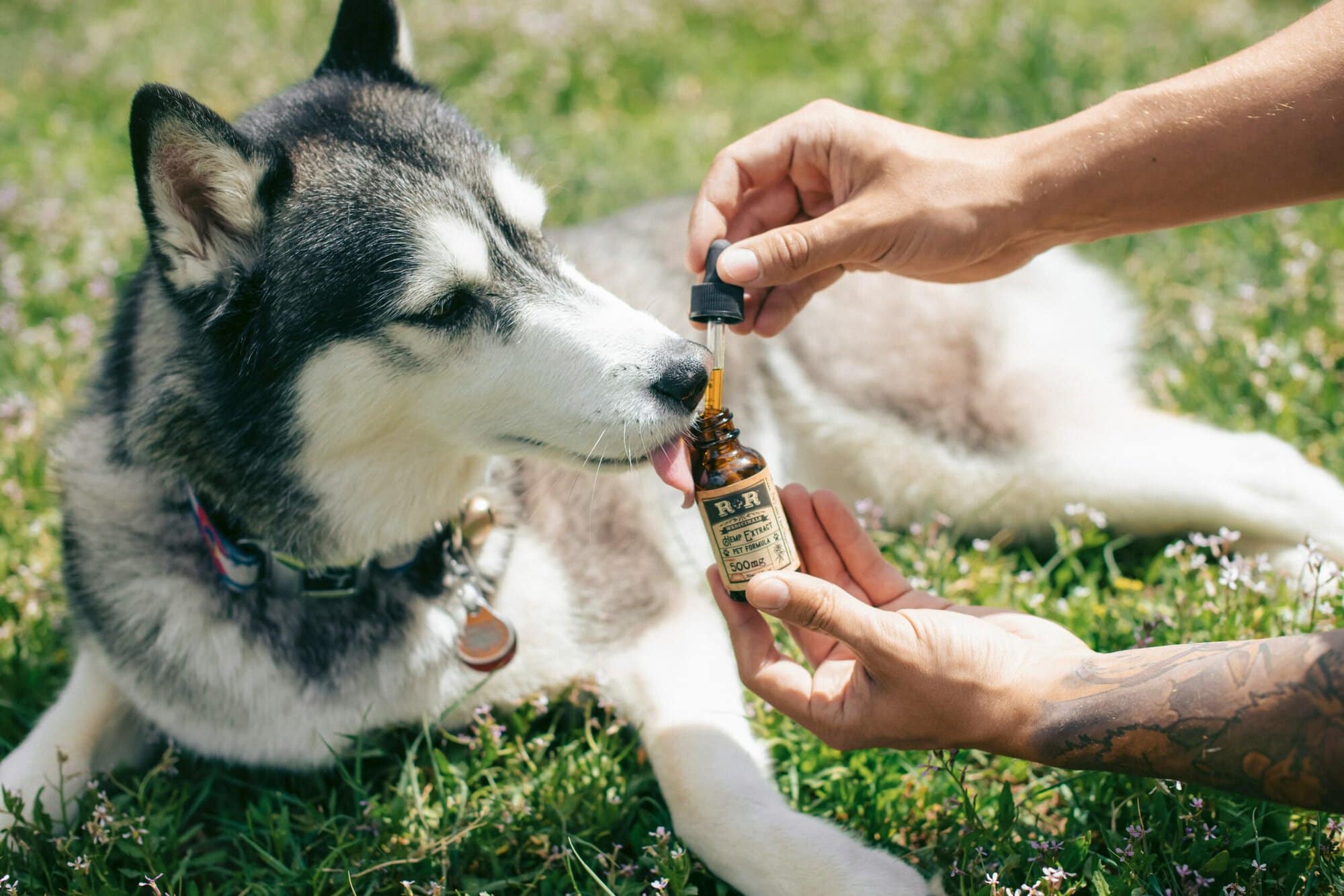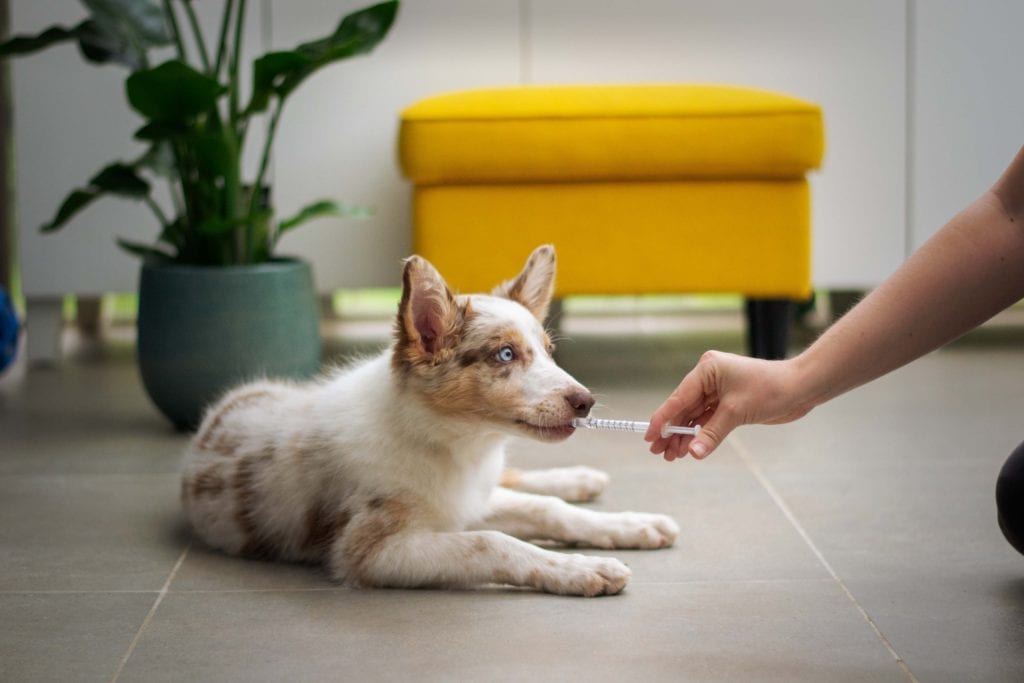There are many different ways to treat atopic dermatitis in pets. Allergy testing and immunotherapy is All Clear Veterinary Dermatology’s favorite option, along with medications to improve comfort like Apoquel, CytoPoint, cyclosporine, and sometimes steroids. Besides these mainstays of treatment, there are a ton of complimentary treatments like supplements that can be added to a treatment plan. These add-on treatments won’t usually be strong enough to control allergies by themselves, but they’re usually very safe so adding them to a treatment plan can help reduce your pet’s needs for more serious drugs (which have more serious side effects).
- Fish oils
- How it works: Omega-3 fatty acids are important for skin and coat health in general, but a specific fatty acid called Eicosapentanoic acid (EPA) will actually suppress allergic inflammation to some extent when given at a high dose.
- Forms: capsules or liquid in a pump bottle to pour over food
- Dose: Give 180mg of EPA per 10 lbs of body weight. This will usually be much higher than the labeled instructions, so you’ll need to read the fine print to see how much EPA is present in the product and do your own math.
- Redonyl by Dechra
- How it works: the ingredient PEA-um (Ultra-micronized Palmitoylethanolamide) is anti-inflammatory to the skin and helps stabilize mast cells (allergy cells present in the skin that release histamine when activated)
- Forms: it comes in chewable treats for small dogs or big dogs, or a flavored powder for cats that you pour over their food
- Dose: it’s given by mouth daily
- Topical Lipids
- How it works: pets with allergies have a skin barrier that doesn’t work correctly, partly because they are lacking ceramides (a type of fat that helps glue skin cells together). A defective skin barrier allows allergens to penetrate the skin more easily and it also makes it easier for bacteria and yeast to overgrow. There are a number of topical products that help put the ceramides back in the skin, strengthening the skin barrier to create healthier skin with fewer infections.
- Forms: It comes as spot-on ampules of oil meant to drip onto the skin (Dermoscent Essential6, Dermoscent Atop7, or Dechra Atopivet spot-on) or a collar that’s left around the neck long-term (Dechra Atopivet collar)
- Dose: apply the spot-on oils once weekly long-term or the collar every 2 months
- Calming
- How it works: We know that anxiety can exacerbate itching both in humans and in our pets. There are a number of safe products meant to reduce stress in pets.
- Forms: Purina makes a probiotic powder called Calming Care for cats and dogs that can be sprinkled on their food daily. Feliway makes a calming pheromone for cats available as a spray (to spray their bedding) or a room diffuser (similar to a Glade plug-in). Adaptil makes a calming pheromone for dogs available as a room diffuser or a collar. Royal Canin also makes a Calm diet intended to reduce anxiety in cats and dogs.
- CBD
- How it works: cannabidiol extract from the hemp plant has anti-inflammatory and calming properties. Numerous studies support its use in anxiety for dogs and one study showed an anti-itch effect in atopic dogs as well.
- Forms: Ellevet Sciences makes a CBD oil designed for dogs. This is the brand that was used in the above-mentioned study so that’s the one I recommend.
- Dose: see package label.
- Zinc
- How it works: Zinc is a constituent or activator of at least 200 known enzymes, including those important for skin and wound healing, cell replication, protein synthesis and immunocompetence. A study showed that zinc supplementation decreased inflammation and the need for anti-itch drugs in allergic dogs, especially in dogs receiving steroids.
- Forms: NutriVed Chewable Zinpro is the one that was used in the study
- Dose: see package label
- Weak recommendation: Probiotics?
- How it works: There are some studies that show giving oral probiotics (healthy GI bacteria) to dogs can help reduce their symptoms of Atopic Dermatitis. I have not seen this benefit in my patients.
- How it works: There are some studies that show giving oral probiotics (healthy GI bacteria) to dogs can help reduce their symptoms of Atopic Dermatitis. I have not seen this benefit in my patients.
- Not recommended: Antihistamines
- How it works: Drugs such as Benadryl, Claritin, and Zyrtec block the H1 histamine receptor, which plays a part in allergic reactions such as allergic rhinitis (stuffy nose), hives, and anaphylaxis. Hoewever, Atopic Dermatitis is caused by lymphocytes releasing cytokines, NOT by histamine release. That is why these drugs rarely help our itchy pets.
- Dose: not recommended





